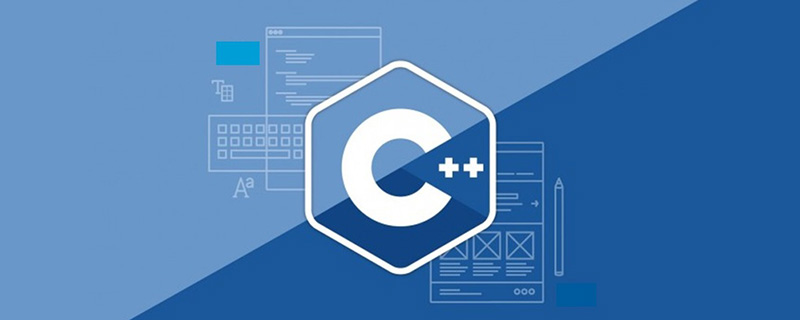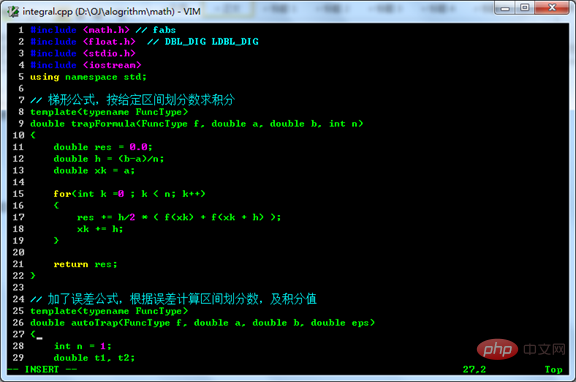What software to use for C++ programming
c Programming software: 1. visual studio, a basically complete development toolset; 2. code blocks, an open source IDE that can be cross-platform; 3. clion, a professional C programming software; 4. dev c, a compact open source C integrated development environment; 5. Vim.

The operating environment of this tutorial: Windows 7 system, C 17 version, Dell G3 computer.
c Programming software
1、visual studio
Microsoft visual studio community 15/17 (commonly abbreviated as vs), the ide known as the number one in the universe does not live up to its name. What is recommended here is the free community version, which can be said to have the advantages of all IDEs. The disadvantage is that it is huge and bloated (large installed memory), but the background usage is very conscientious. In addition to the basic c language, you can also develop c, c#, asp, etc. Now many companies and individuals are using it, which not only facilitates team collaboration, has high development efficiency, and is very convenient to use.
2. Code blocks
is also an open source IDE that can be used across platforms, that is to say, windows, linux, and macOS are all available. use. It supports the new C99 standard. The installation package is small and only contains all components. It is only over 90M in size. It comes with the mingw compiler, supports colorful syntax eye-catching display, supports code completion, and supports engineering management, project construction, debugging and other functions. The configuration is also very convenient, with simple keyword prompts. The official Chinese version is not provided, but there is a third-party Chinese version.
3, clion
This is a professional C/C programming software, a product of jetbrains company, the same type of idea, pycharm, etc., everyone should be very familiar with it. learn. It supports common functions such as smart completion, syntax prompts, and code highlighting. In addition, it is also compatible with advanced functions such as cmake and code reconstruction. Therefore, development efficiency is higher and it is more suitable for professional developers. However, the disadvantage is that the software itself is not free and requires Pay for copyright.
4, dev c
Open source c ide, one-click download and installation without any extra configuration, there is a Chinese version. The themes are diverse and quite lightweight. It comes with simple GCC and GDB debugging tools, which can directly compile and run C programs. The basic functions are very similar to the early VC6.0, without any automatic completion, syntax prompts and syntax checking functions, and there are relatively few plug-in extensions, so , for beginners, it is a great exercise for basic skills.
Features:
Optimize and improve the code completion prompt function
Check for syntax errors when entering Enter, and Errors are marked with wavy lines
User editing interface enhancements and improvements
Redesigned and improved debugging functions
Improve structure browser
Automatic linking function: You can decide which library files to link during compilation based on the header files included in the user code
When running and debugging the console program, you can use a data file instead of standard input (keyboard input). This can reduce the trouble of repeatedly entering data when debugging the program
Integrate the EGE drawing library and the turtle drawing library and their project templates to enhance the learning interest of beginners
Supports opening, editing and compiling UTF-8 encoded source code files.
Add the Refactor->Symbol Rename function.
GCC 9.2 and GDB 9.2 (Mingw.org version, compatible with Windows XP. Starting from version 6.3-beta2, it will be changed to mingw-w64 gcc 10.2)
Compatible with Windows XP/Windows 7/Windows 10
Supports Windows 7/Windows 10 high DPI
5, Vim
It is said that vim is a "god editor", I installed one with the mentality of giving it a try:

Personally, I think vim is the best The advantage is that it can work in a command line environment only, such as ubuntu server.
Of course, there is also cross-platform!
For more programming-related knowledge, please visit: Programming Video! !
The above is the detailed content of What software to use for C++ programming. For more information, please follow other related articles on the PHP Chinese website!

Hot AI Tools

Undresser.AI Undress
AI-powered app for creating realistic nude photos

AI Clothes Remover
Online AI tool for removing clothes from photos.

Undress AI Tool
Undress images for free

Clothoff.io
AI clothes remover

Video Face Swap
Swap faces in any video effortlessly with our completely free AI face swap tool!

Hot Article

Hot Tools

Notepad++7.3.1
Easy-to-use and free code editor

SublimeText3 Chinese version
Chinese version, very easy to use

Zend Studio 13.0.1
Powerful PHP integrated development environment

Dreamweaver CS6
Visual web development tools

SublimeText3 Mac version
God-level code editing software (SublimeText3)

Hot Topics
 1659
1659
 14
14
 1416
1416
 52
52
 1310
1310
 25
25
 1258
1258
 29
29
 1233
1233
 24
24
 C# vs. C : History, Evolution, and Future Prospects
Apr 19, 2025 am 12:07 AM
C# vs. C : History, Evolution, and Future Prospects
Apr 19, 2025 am 12:07 AM
The history and evolution of C# and C are unique, and the future prospects are also different. 1.C was invented by BjarneStroustrup in 1983 to introduce object-oriented programming into the C language. Its evolution process includes multiple standardizations, such as C 11 introducing auto keywords and lambda expressions, C 20 introducing concepts and coroutines, and will focus on performance and system-level programming in the future. 2.C# was released by Microsoft in 2000. Combining the advantages of C and Java, its evolution focuses on simplicity and productivity. For example, C#2.0 introduced generics and C#5.0 introduced asynchronous programming, which will focus on developers' productivity and cloud computing in the future.
 Where to write code in vscode
Apr 15, 2025 pm 09:54 PM
Where to write code in vscode
Apr 15, 2025 pm 09:54 PM
Writing code in Visual Studio Code (VSCode) is simple and easy to use. Just install VSCode, create a project, select a language, create a file, write code, save and run it. The advantages of VSCode include cross-platform, free and open source, powerful features, rich extensions, and lightweight and fast.
 Golang and C : Concurrency vs. Raw Speed
Apr 21, 2025 am 12:16 AM
Golang and C : Concurrency vs. Raw Speed
Apr 21, 2025 am 12:16 AM
Golang is better than C in concurrency, while C is better than Golang in raw speed. 1) Golang achieves efficient concurrency through goroutine and channel, which is suitable for handling a large number of concurrent tasks. 2)C Through compiler optimization and standard library, it provides high performance close to hardware, suitable for applications that require extreme optimization.
 The Performance Race: Golang vs. C
Apr 16, 2025 am 12:07 AM
The Performance Race: Golang vs. C
Apr 16, 2025 am 12:07 AM
Golang and C each have their own advantages in performance competitions: 1) Golang is suitable for high concurrency and rapid development, and 2) C provides higher performance and fine-grained control. The selection should be based on project requirements and team technology stack.
 Golang and C : The Trade-offs in Performance
Apr 17, 2025 am 12:18 AM
Golang and C : The Trade-offs in Performance
Apr 17, 2025 am 12:18 AM
The performance differences between Golang and C are mainly reflected in memory management, compilation optimization and runtime efficiency. 1) Golang's garbage collection mechanism is convenient but may affect performance, 2) C's manual memory management and compiler optimization are more efficient in recursive computing.
 Python vs. C : Learning Curves and Ease of Use
Apr 19, 2025 am 12:20 AM
Python vs. C : Learning Curves and Ease of Use
Apr 19, 2025 am 12:20 AM
Python is easier to learn and use, while C is more powerful but complex. 1. Python syntax is concise and suitable for beginners. Dynamic typing and automatic memory management make it easy to use, but may cause runtime errors. 2.C provides low-level control and advanced features, suitable for high-performance applications, but has a high learning threshold and requires manual memory and type safety management.
 How to execute code with vscode
Apr 15, 2025 pm 09:51 PM
How to execute code with vscode
Apr 15, 2025 pm 09:51 PM
Executing code in VS Code only takes six steps: 1. Open the project; 2. Create and write the code file; 3. Open the terminal; 4. Navigate to the project directory; 5. Execute the code with the appropriate commands; 6. View the output.
 Golang vs. C : Performance and Speed Comparison
Apr 21, 2025 am 12:13 AM
Golang vs. C : Performance and Speed Comparison
Apr 21, 2025 am 12:13 AM
Golang is suitable for rapid development and concurrent scenarios, and C is suitable for scenarios where extreme performance and low-level control are required. 1) Golang improves performance through garbage collection and concurrency mechanisms, and is suitable for high-concurrency Web service development. 2) C achieves the ultimate performance through manual memory management and compiler optimization, and is suitable for embedded system development.




